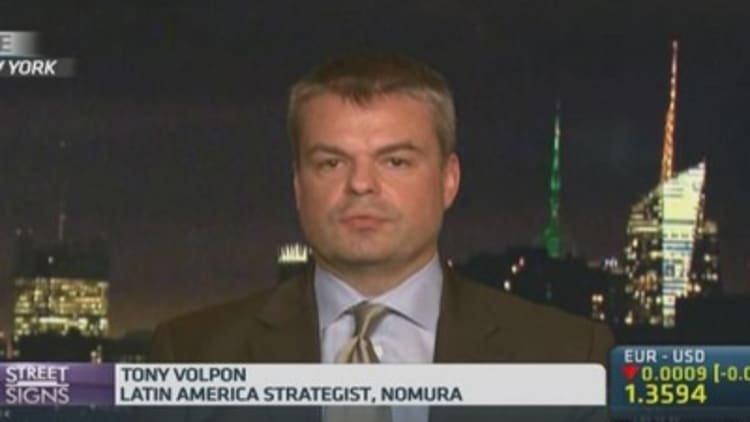Brazil's crushing defeat on the World Cup pitch could foreshadow another wipeout to come: the country's president, Dilma Rousseff.
Brazil's favored squad took a 7-1 beating against Germany on Tuesday that some soccer commentators are calling the worst upset in the history of the World Cup. Now that the feel-good sentiment in the country has evaporated, there will likely be an intensified focus on the World Cup's sky-high costs in the midst of a flagging economy and lagging infrastructure, said the managing director of a firm that monitors sovereign credit risk.
"There's no question that Brazil's thumping defeat to Germany adds to the sense of socioeconomic malaise that has been gripping Brazil for some time," said Nicholas Spiro, managing director of Spiro Sovereign Strategy. "Rousseff needs this defeat like she needs a hole in the head, not least because of the concerns of Brazil's citizens about the extravagant expenditures of the World Cup, when citizens are demanding hospitals and schools."
Ian Vasquez, a director at the libertarian think tank Cato Institute, agreed.
"This will intensify the malaise in Brazil," Vasquez said. "About $11 billion has been spent on World Cup preparations, on stadiums and infrastructure, at a time that other infrastructure is taking years and years to undertake, and hasn't yet been completed."
Read MoreBrazil gets crushed, and the Internet watches in horror

Vasquez also pointed to lackluster GDP growth over the last decade and rampant government corruption as factors that could leave the door open for a centrist opposition candidate like the Social Democracy Party's Aecio Neves.
A Rousseff defeat would be good news in the eyes of Brazil's business community, Spiro said.
"The equity markets in particular would like to see the back of Dilma Rousseff," said Spiro. "A win by Rousseff is a continuation of the status quo, and the status quo has been a failure. Brazil's economy has slowed to a crawl, it's flirting with recession, and interest rates are in double figures."
Read MoreGermany thrashes Brazil in markets, too
Harold Trinkunas, a senior fellow at the Brookings Institute, said that while Rousseff's administration has been delaying tough economic reforms in the run-up to this year's election, they will have to be made soon.
"The government's going to have to make some adjustments to the currency, which has been quite strong and hurting exports, and address the high cost of living domestically, the high cost of imports, and expansion of consumer credit to quite high levels," Trinkunas said. "They have a lot of issues to deal with."
There's no 'Jogo Bonito' when it comes to Brazilian politics.Nicholas SpiroManaging director, Spiro Sovereign Strategy
Art Hogan, chief market strategist at Wunderlich Securities, said that while needed economic reforms likely will be pursued by any winning candidate, speed of implementation is a question that may well hinge on the results of this year's election.
"It's much more a question of the pace of change," Hogan said. "The opposition candidate has changes that would probably be implemented much more rapidly."
Read MoreWorld Cup overpasses project crashes in Brazil
Nicholas Spiro of Spiro Sovereign Strategy agreed.
"The next presidential candidate is going to have to bite the bullet of reform. The difference is the pace," he said. "Brazil needs to reinvent the wheel right now, and apparently so does its football team. There is no 'Jogo Bonito' [Beautiful Game] when it comes to Brazilian politics."
—By CNBC's Adam Molon

